Slavery in supply chain reports
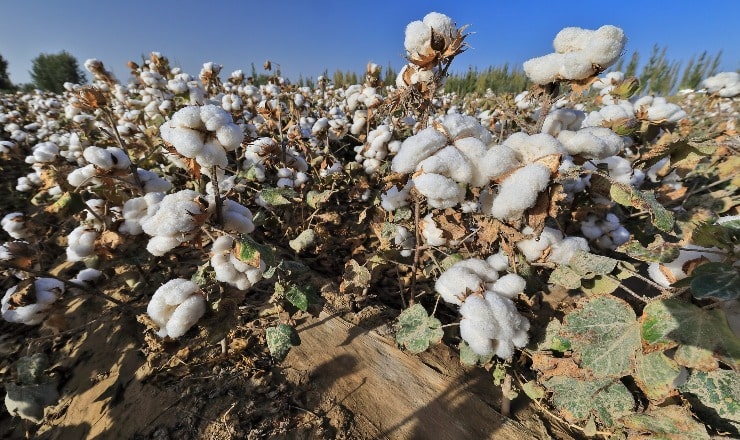

Transposition Guide for the Corporate Sustainability Due Diligence Directive (CSDDD)
The European Coalition for Corporate Justice (ECCJ), in collaboration with the Clean Clothes Campaign, European Centre for Constitutional and Human Rights, Frank Bold, Oxfam, CIDSE, FIDH, Anti-Slavery International, and Friends of the Earth Europe, publishes the Transposition Guide for the Corporate Sustainability Due Diligence Directive (CSDDD). This essential guide provides key insights and recommendations for the upcoming transposition phase of this EU directive.
The Transposition Guide was developed by a coalition of civil society organisations (CSOs) with the goal of supporting fellow CSOs in advocating for ambitious and effective transposition of the CSDDD across European Union Member States. The CSDDD represents a major advancement in promoting responsible business conduct within and beyond the EU, holding companies accountable for human rights and environmental harm resulting from their activities.
Following its adoption and publication in the EU’s Official Journal in June 2024, EU Member States are now in the process of integrating the Directive into national law over the next two years.
This guide outlines key priorities to address in the transposition process, including:
- Effective access to justice, including reversing the burden of proof in civil claims and ensuring practical time limitations.
- Effective and meaningful stakeholders engagement, which are the core of the chain of activities. This engagement should be done early and should be continuous.
- Broader personal scope, while removing conditions on the material scope defining human rights and aligning the environmental scope on international norms.
- Extending due diligence obligations to all relevant parts of the value chain, including the downstream activities of financial services.
This guide is a key resource for CSOs working towards an effective application of the CSDDD.
A call for UK ban on products tainted with forced labour
To fulfil its commitment to eliminate forced labour from global value chains, the UK must introduce
import controls on products tainted with forced labour. Anti-Slavery International calls on the UK
Government to introduce primary legislation to ban the import of goods tainted with forced
labour. The ban should cover products made (in whole or in part) or transported using forced
labour. This briefing document outlines the rationale behind this call, as well as the elements that the
proposed law must include.
A call for a UK Business, Human Rights and Environment Act
Anti-Slavery International is campaigning alongside the Corporate Justice Coalition and other organisations to make the case for a new Business Human Rights and Environment Act (BHRE).
We have published a policy paper with an overview of the rationale behind our legislative call. We outline the UK’s current lack of mechanisms to hold companies accountable for a failure to prevent abuses, the need to level the playing field between businesses, as well as the urgency for guaranteeing access to justice for victims of corporate abuses. We also provide a series of recommendations to ensure the UK plays its part in addressing forced labour in value chains. This includes both the principal elements of the BHRE Act and a wider mix of additional measures.
Note this policy paper was updated in July 2024.
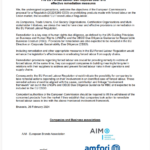
The EU Forced Labour Ban requires clear and effective remediation measures: Statement to the negotiators
As Companies, Trade Unions, Civil Society Organisations, Certification Organisations and Multi-Stakeholder Initiatives, we stress the need to have clear and effective provisions on remediation in the EU Forced Labour Regulation.
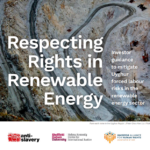
Uyghur Forced Labour in Green Technology
As the world continues to experience the devastating impacts of climate change, a full transition away from the fossil fuel economy is imperative. The solar and electric vehicle (EV) industries in particular, are critical to this transition. However, both industries have been heavily implicated in forced labour in the Uyghur Region, where the Chinese Government is systematically persecuting the native Uyghur and Turkic and Muslim-majority peoples. A central element of this persecution occurs through state-imposed forced labour.
Coordinated global action is needed to shift solar supply chains away from the Uyghur Region and prevent the solar and EV industries from becoming any more reliant on the Region than they currently are. A truly just transition from fossil fuels cannot be achieved as long the current reliance on the Uyghur Region remains.
With this objective in mind, Anti-Slavery International partnered with the Investor Alliance for Human Rights and the Helena Kennedy Centre for International Justice at Sheffield Hallam University to publish a series of reports to support key stakeholders in the clean energy transition to address forced labour of Uyghurs and other Muslim and Turkic-majority peoples in the production of green technology:
- For Investors: Respecting Rights in Renewable Energy Investor guidance to mitigate Uyghur forced labour risks in the renewable energy sector. This Guidance provides investment professionals with the tools to identify, exclude or engage businesses linked to human rights violations against the Uyghur people from their green energy portfolios. This Guidance also explores how investors can re-channel investments into companies which champion sustainability, innovation, and supply chain resilience.
- An accompanying annex to the Investor Guidance
- For Governments: Respecting Rights in Renewable Energy: Supporting Investment in Sustainable and Ethical Green Technologies: A policy brief to the UK Government. A coordinated and comprehensive response from governments and international institutions will be critical to helping investors and industries operationalise the changes necessary to shift the landscape of green energy production. As such, this policy brief includes recommendations on legislative and regulation actions to the UK Government to support a shift of clean energy supply chains away from the Uyghur Region. Although targeted to the UK Government, this policy brief includes recommendations which are applicable to other governments.
- For all readers: “Respecting Rights in Renewable Energy: Addressing forced labour of Uyghurs and other Muslim and Turkic-majority peoples in the production of green technology”. A summary of our findings and recommendations across the project.
You can also read our blog explaining the research, core recommendations and considerations for a just transition.
The project was funded through an open call for proposals by the Modern Slavery and Human Rights Policy and Evidence Centre (Modern Slavery PEC), which in turn is funded and supported by the UK Arts and Humanities Research Council (AHRC).
Photo credit: Peter Chou Kee Liu. Creative Commons license.
Recommendations on responsible disengagement in the EU Corporate Due Sustainability Due Diligence Directive
Open letter from Civil Society Organisations’ to EU policy makers regarding recommendations on responsible disengagement in the Corporate Due Sustainability Due Diligence Directive (“CSDDD”), Articles 7(5) and 8(8) (suspension and termination of business relationships).
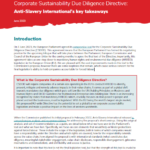
Analysis of European Parliament's proposal for the Corporate Sustainability Due Diligence Directive
On 1 June 2023, the European Parliament agreed its compromise text for the Corporate Sustainability Due Diligence Directive (CSDDD). This agreement means that the European Parliament has formed its negotiating position for the upcoming trilogue that will take place between the Parliament, European Commission and Council of the European Union for the coming months to agree the final text of the Directive. Importantly, this agreement takes us one step closer to mandatory human rights and environmental due diligence (HREDD)
legislation in the European Union (EU). We are pleased with the vast improvements made in this text to the Commission’s proposal, however there are some loopholes that remain, which cause serious concern for the final legislation’s ability to hold companies accountable for forced labour.

Human rights due diligence on the risks of modern slavery for displaced workers
This guidance, published with La Strada International, explains how businesses can prevent and mitigate some of the risks of labour exploitation, forced labour and trafficking affecting displaced people. It is aimed in particular at businesses who work in or with suppliers in countries neighbouring conflict zones or where there are high numbers of displaced people.
Written evidence submission on Batteries for Electric Vehicle Manufacturing
Written evidence submitted by Anti-Slavery International to the Business, Energy and Industrial Strategy Committee in regarding Batteries for Electric Vehicle Manufacturing.
Anti-Slavery International welcomes the Business, Energy and Industrial Strategy Committee’s enquiry, which recognises the important role of electric vehicles (‘EV’) in the UK Government’s vital journey to net zero. However, we urge the Committee to recognise and assess the risk of the use of forced labour of Uyghurs and other Turkic and Muslim-majority peoples in the EV industry. Thus, this submission focuses on the question in the Call for Evidence “What are the risks to the UK automotive industry of not establishing sufficient battery manufacturing capacity in the UK?”
Written evidence submission on the risk of forced labour usage in critical minerals extraction
Written evidence submitted by Anti-Slavery International to the Foreign Affairs Committee to the Critical Minerals enquiry.
Anti-Slavery International welcomes the Foreign Affairs Committee’s enquiry, which recognises the important role of critical minerals in the UK Government’s green transition. In this enquiry, we urge the Committee to recognise and assess the risk of the use of forced labour of Uyghurs and other Turkic and Muslim-majority peoples in the mining and processing of critical minerals and manufacturing of
inputs made with critical minerals.
Thus, this submission focuses on the questions in the Call for Evidence which relate to responsible sourcing, diversification of supply chains and the role of the FCDO.

Evidence submission to the UK Environmental Audit Committee on Uyghur forced labour in electric vehicle supply chains
Anti-Slavery International
In written evidence to the UK’s Environmental Audit Committee, we urge the Committee to recognise and assess the risk of the use of forced labour of Uyghurs and other Turkic and Muslim-majority peoples in the solar industry and energy storage technology industries, and to develop recommendations which map out a pathway for how the UK Government can support the UK solar industry to develop a truly ‘clean’ industry, which does not rely on the systemic forced labour of persecuted communities.
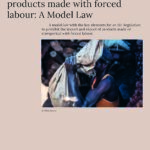
A Model Law for the proposed EU Regulation on Forced Labour
As the world’s largest single market, the EU has an enormous opportunity to set global leadership in its of design laws and approaches to address systemic forced labour in corporate supply chains. This EU toolbox of legislation and policy must include legislation which controls the trade and retail of products made with forced labour on the EU market. Alongside other measures, including mandatory due diligence legislation, a forced labour ban will act as a powerful government enforcement tool which incentivises companies to meaningfully address forced labour in their supply chains.
Anti-Slavery International, ECCHR and The Greens/EFA Group therefore welcome the European Commission’s “Proposal for a Regulation on prohibiting products made with forced labour on the Union market” (‘Regulation’), published on 14 September 2022. Yet to be effective, significant improvements must be made to the European Commission’s proposal.
To help shape the design of the Regulation, this document sets out a model law with the key elements which must be included in the European Commission’s proposal, in order to create a worker-centred Regulation. As the debate in the European Union continues, we urge all decision makers to consult with organisations representing workers around the world, to ensure that the Regulation is designed with their needs and interests at its core.
Principles for strengthening measures on Supply Chains through the new Modern Slavery Bill
Following the UK government’s announcement of a new Modern Slavery Bill which aims to reduce the prevalance of modern slavery in supply chains, we, along with allies outlined the principles for strengthening measures on supply chains with this Bill.
There is huge potential for action by businesses to reduce modern slavery around the world. The Transparency in Supply Chains provision of the UK’s Modern Slavery Act 2015 led the world in addressing modern slavery in company supply chains. However, non-compliance and poor quality reporting has limited its effectiveness and it has become evident that additional legal approaches beyond reporting are necessary. The forthcoming bill is an opportunity to strengthen our legislation and give the UK the tools needed to prevent goods produced through forced labour entering UK supply chains.
Addressing Forced Labour in Global Supply Chains
17.3 million people are estimated to be in forced labour in the private sector and 3.9 million in state-imposed forced labour. Tackling the root causes that drive this forced labour requires a toolbox of measures. In this brief we outline the measures that are needed to truly tackle forced labour in global supply chains.
Our response to the European Commission call for evidence on the proposed EU forced labour instrument
In February 2022, the European Commission committed to preparing a new legislative instrument to “effectively ban products made by forced labour from entering the EU market”.
The European Commission has since committed to publishing its proposal for this instrument in September 2022, and in May 2022 published its Call for Evidence for this proposal, committing to a ban which would cover both domestic (EU) and imported products. On 9 June 2022, the European Parliament voted overwhelmingly in favour of a resolution, which advocates strongly for a new trade instrument to ban products made by forced labour.
Anti-Slavery International and the European Centre for Constitutional and Human Rights (ECCHR) welcome these developments with a view to ensure that goods made or transported in-whole or in-part with forced labour, including forced labour of children, cannot be sold in the European Union.
This contribution builds on Anti-Slavery International and ECCHR’s experience in working with partners based in countries with a high prevalence of forced labour which are linked to supply chains of products sold in the EU. Furthermore, this contribution builds on the lessons learnt from existing import control measures in the USA, and analysis of current gaps in EU legislation.
Joint submission to the UN Special Rapporteur on contemporary forms of slavery – state imposed forced labour in the Uyghur region
A joint submission by Anti-Slavery International, Investor Alliance for Human Rights, Uyghur Human Rights Project, and World Uyghur Congress on systematic imposed forced labour in the Xinjiang Uyghur Autonomous Region (the Uyghur Region) targeting the Uyghur population and other Turkic and Muslim-majority peoples on the basis of their religion and ethnicity.
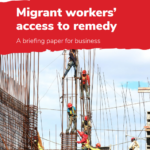
A Business Briefing on Migrant Workers' Access to Remedy
As an integral part of their workforce, in operations and supply chains, companies should take steps to make sure migrant workers’ rights are respected and upheld. This must include steps to improve access to effective remedy for migrant workers, including by understanding and addressing the underlying drivers of exploitation and barriers migrant workers face when seeking remedy. This report guides companies on how they can support migrant workers’ access to remedy.
Principal elements of a UK corporate duty to prevent adverse human rights and environmental impacts – A ‘failure to prevent’ law
A coalition of civil society organisations is calling for the introduction a new UK ‘mandatory human rights and environmental due diligence’ law, based on the duties to prevent tax evasion and bribery found in the Criminal Finances Act 2017 and the Bribery Act 2010 – as called for by the UK Parliament’s Joint Committee on Human Rights, and found to be legally feasible by the British Institute of International and Comparative Law.
These principles for a new law have been prepared by UK civil society organisations who are working to strengthen corporate accountability for human rights abuses, including modern slavery, and environmental damage. It provides an overview of the principle elements needed in such new legislation.
The principles are endorsed by over 30 individual UK organisations, including Anti-Slavery International.
EU law. Global impact. A report considering the potential impact of human rights due diligence laws on labour exploitation and forced labour
The European Commission will soon publish a proposal for an EU business and human rights law that would require companies operating in the EU to prevent and address human rights abuses and environmental damage in their global supply chains. This commitment to mandatory human rights and environmental due diligence could help tackle forced labour and child labour in supply chains around the world.
On 28 June 2021, we published new research, undertaken by the Rights Lab, University of Nottingham, to understand how the upcoming EU business and human rights law could affect workers’ human rights through two case studies: the leather industry in India, and the coffee industry in Brazil.
Anti-Slavery International and European Center for Constitutional and Human Rights’ position on import controls to address forced labour in supply chains
Following the G7 Summit in Carbis Bay, we, together with the European Centre for Constitutional and Human Rights, have published a position paper on when and how governments should introduce import controls to end forced labour. Import controls should not be the only measure used to address forced labour in global supply chains. Instead, they should be introduced as part of strong legal, trade and development framework to address the root causes of forced labour – poverty, lack of legal protection, worker representation and discrimination. In particular, we have worked for many years to call for the introduction of stronger laws such as mandatory human rights and environmental due diligence (mHREDD), and we believe that the two approaches – mHREDD and import controls – are complementary. Although specifically concerned with developments in the EU, this position paper is applicable to all governments.
Anti-Slavery International's submission to the European Commission consultation for an initiative on sustainable corporate governance (mHREDD)
Anti-Slavery International response to the public consultation on the need and objectives for EU intervention on sustainable corporate governance. We took part in this consultation, together with partner organisations in more than 20 countries, including Bangladesh, Brazil, Chile, Colombia, Ghana, India, Indonesia, Nepal, South Africa and Turkmenistan. We also actively encouraged our supporters and allies to do the same, and we want to thank everyone who took part: this consultation proved to the European Commission that people all over the world look to the EU to show leadership, courage and compassion for oppressed people everywhere.
Written submission by members and endorsers of the Coalition to End Forced Labour in the Uyghur Region to the BEIS Committee consultation on Forced labour in UK value chains
This submission has been submitted on behalf of the 31 members and endorsers of the Coalition to End Forced Labour in the Uyghur Region, a coalition of over 280 Uyghur representative groups, civil society organisations, trade unions, faith-based groups and investors united to end state-sponsored forced labour and other egregious human rights abuses against people from the Uyghur Region in China, known to local people as East Turkistan.
Submission to BEIS Committee consultation on Forced labour in UK value chains:
Joint civil society response to the UK Government’s response to the Transparency in Supply Chains consultation
Our statement with 9 partner organisations responds to the Government’s response to the Transparency in Supply Chains consultation, published in September 2020. We argue that a lack of commitment to meaningful sanctions and enforcement measures is a major concern – and that much tougher government action is needed to tackle modern slavery and other human rights abuses in corporate supply chains.
Principal elements for an EU mandatory human rights and environmental due diligence law
As part of its sustained efforts to advocate for an EU legislation on mandatory Human Rights Due Diligence and as the legislative debate opens among EU institutions, Anti-Slavery International along with Action Aid, Amnesty International, CIDSE, Clean Clothes Campaign, ECCHR, ECCJ, FIDH, Friends of the Earth Europe, Global Witness and Oxfam have laid out a vision for the principal elements of such an EU legislation.
Due diligence has emerged as one of the primary tools for business enterprises, including financial institutions, to live up to their responsibilities towards people and planet.
It is understood as the process of identifying and assessing; ceasing, mitigating and preventing; tracking and monitoring; communicating and accounting for environmental and human rights risks and impacts. It is based on international standards that have been developed in collaboration with business enterprises, governments and civil society and across multiple sectors, and endorsed by the EU.
As the negotiations open, Anti-Slavery International stands open to dialogue with all stakeholders and will in particular invite its partners based in the Global South to provide their vision of what is needed to make change happen on the ground. The voices of people affected by forced and child labour and people vulnerable to labour exploitation must be central to the design and implementation of the legislation.

What if? Case studies of human rights abuses and environmental harm linked to EU companies, and how EU due diligence laws could help protect people and the planet
Anti-Slavery International and ECCJ
ECCJ’s and Anti-Slavery International’s report details a number of case studies where EU-based companies have failed to address corporate abuse and environmental harm in their global value chains, profited from it, and so far managed to avoid liability before the courts.
The case studies clearly demonstrate how EU wide mandatory cross-sectoral human rights and environmental due diligence legislation, with improved access to remedy rules, would make a difference in these cases. Only by introducing binding legislation can we truly protect people and the planet, tackle human rights and environmental abuses linked to European operations, products and services, and finally hold out-of-control EU-based companies to account.
Now is the time to make it happen.
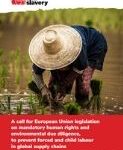
European Union proposed legislation on mandatory human rights and environmental due diligence – policy paper
Anti-Slavery International.
Anti-Slavery International, along with a large coalition of NGOs and trade unions, is calling on the European Commission to introduce EU-wide human rights and environmental due diligence legislation. This law would require companies and financial institutions to identify, prevent, mitigate and account for human rights abuses and environmental damage caused by their operations, subsidiaries and value chains. This policy paper outlines why the legislation is important to prevent forced and child labour in global supply chains and Anti-Slavery International’s recommendations to the European Union and its member states on the legislation.
A call to action from over 100 NGOs for EU human rights and environmental due diligence legislation
Over 100 civil society organisations and trade unions have called on the European Union to bring forth this term new corporate accountability legislation requiring companies to respect human rights and the environment in their global value chains and operations. Such legislation should establish a corporate duty to respect human rights and the environment and require companies and financial institutions to identify, prevent, mitigate and account for abuses and harm in their domestic and global operations, activities, products, services, supply chains and exports. The legislation should hold such companies legally accountable and provide access to justice for victims.
Anti-Slavery has been leading this action, together with NGO partners including Clean Clothes Campaign and the European Coalition for Corporate Justice.
A call for EU human rights and environmental due diligence legislation:
Submission to the UK government on the UK Transparency in Supply Chains Clause of the Modern Slavery Act
Submission by CORE Coalition, Anti-Slavery International, Amnesty International, Business and Human Rights Resource Centre, Christian Aid, Environmental Justice Foundation, Fairtrade Foundation, FLEX, Freedom Fund, Freedom United, Traidcraft Exchange, TUC, UNICEF and UNISON.
We’re calling on the UK government to:
- Introduce mandatory criteria for reporting
- Introduce an effective Government-run registry
- Introduce meaningful sanctions for failures to comply with the TISC provision
- Extend the reporting requirement to the public sector
- For the UK government to go beyond reporting and introduce mandatory human rights due diligence.
Briefing for Westminster Hall Debate on the independent review of the Modern Slavery Act
Improving the effectiveness of the supply chain reporting requirement in UK Modern Slavery Act 2015 and moving towards mandatory human rights due diligence. This review considers the successes and limitations of the implementation of the reporting requirements set out in the UK Modern Slavery Act to reducing modern slavery in supply chains. The review identifies that research by civil society and reports by Parliamentary committees have exposed flaws in the legislation and its implementation.
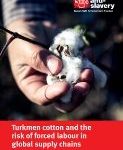
Turkmen cotton and the risk of forced labour in global supply chains
This report brings the strong links between Turkey and Turkmenistan to light. Being the 11th largest cotton producer in the world, Turkmenistan’s apparel and textile exports pose a significant risk of forced labour tainting global supply chains and present a challenge to brands’ due diligence. Anti-Slavery International has documented cases of Turkish enterprises that operate in Turkmenistan and claim to sell their products to well-known international brands. These links show that Turkey is acting as the main gateway for its cotton products to global supply chains, and brands should be aware of it.
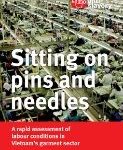
Sitting on pins and needles report
This report is a rapid assessment of labour conditions in Vietnam’s export-oriented textile and garment sector. The findings of the report, that highlight the risk of forced labour, child labour and child slavery, showcase the need for pan-European legislation that includes mandatory human rights due diligence at the EU level. As the second largest garment producer in Asia, and key trading partner of the EU, the Vietnam case was worth looking at. With Vietnam and the EU in the middle of negotiations on a future trade agreement, this study proves the EU should set higher standards for those it chooses to trade with.
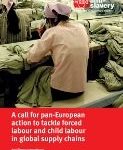
A call for pan-European action to tackle forced labour and child labour in global supply chains
This briefing for European policy makers outlines the increased risk of forced and child labour, in global supply chains of goods and services. It argues that extant national and EU law and policies are insufficient to eradicate slavery in supply chains, since they cover only specific sectors (such as conflict minerals or timber) or generic transparency requirements. Anti-Slavery International calls for a systematic, pan-European approach to tackling forced and child labour in global supply chains that includes binding due diligence, requiring businesses to proactively tackle human rights abuses throughout their supply chains.
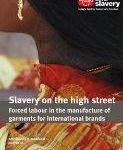
Slavery on the high street. Forced labour in the manufacture of garments for international brands.
Anti-Slavery International.
New report from Anti-Slavery International exposes how top UK high street brands are selling clothing made by girls in slavery in southern India. Our research has uncovered the routine use of forced labour of girls and young women in the spinning mills and garment factories of five Indian clothing manufacturers that supply major western clothing retail brands.
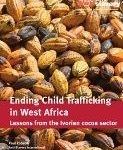
End Child Trafficking in West Africa: Lessons from the Ivorian cocoa sector
Anti-Slavery International, Paul Robson.
This report finds that trafficking of children to cocoa farms in Côte d’Ivoire still occurs. The research found significant numbers of young people in Mali and Burkina Faso who had worked as children in cocoa farms in Côte d’Ivoire in the last five years. The practices occur in the context of large-scale movements of people within the region including the trafficking of children to other agricultural activities and to other sectors.